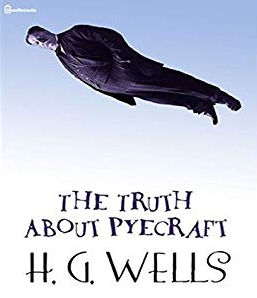“The Truth about Pyecraft” is a short story written by the English author H. G. Wells (1866–1946), first published in The Strand MagazineMonthly publication founded by George Newnes, published 1891–1950, credited with introducing the short story to a British audience. in April 1903 and subsequently in Twelve Stories and a DreamCollection of 13 short stories by H. G. Wells, first published in 1903. (1903) and The Country of the Blind and Other StoriesCollection of 33 short stories by H. G. Wells, first published in 1911. (1911).[1] It concerns “the fattest clubman in London”, Pyecraft, and his efforts to lose weight.
Synopsis
The story, as narrated by Mr Formalyn, concerns a fellow gentleman’s club member called Pyecraft, a “Great, uneasy jelly of substance”. Pyecraft has so irritated Formalyn that the latter has decided to tell the world the truth about him and his embarrassing secret. Formalyn begins by describing how the rotund Pyecraft continually annoys him with his boring stories, and in particular his obsession with his obesity.
Eventually Formalyn gives Pyecraft an occult weight-loss recipe that belonged to his Hindustani great-grandmother. A month later Pyecraft telegraphs Formalyn at their club: “For heaven’s sake come“. After getting Pyecraft’s address from the hall porter, Formalyn calls at his house in Bloomsbury, where the housekeeper tells him that Pyecraft has been cloistered in his living room for the last twenty-four hours. There he is found as fat as ever, floating helplessly in the air against the ceiling. They conclude that the recipe has literally reduced his weight, but not his fatness.
Formalyn assists with various ingenious devices and techniques to allow Pyecraft to traverse his room while floating. For example, Pyecraft gets down from the bookcase by taking out a couple of heavy tomes of the Encyclopædia Britannica. Some time later, it occurs to Formalyn that Pyecraft’s garments could be stuffed with heavy lead pieces to keep him on the ground; he even remarks that Pyecraft could sail without fear of a shipwreck, for he could just hover ashore after removing some of the weight.
Pyecraft returns to the club with Formalyn’s assistance, but continues to overeat. Initially they agree to keep the secret of Pyecraft’s weightlessness to themselves, until Formalyn’s increasing irritation with the obsessive Pyecraft boils over into his writing this account.
Commentary
“The Truth About Pyecraft”, although an impossible and fantastical tale, demonstrates the distinction between mass, an absolute measure of the amount of matter, and weight, the relative attraction between two masses. So although Pyecraft is continually bemoaning his weight, he is in reality complaining about his mass.[2]
See also
- H. G. Wells bibliographyList of publications written by H. G. Wells during the more than fifty years of his literary career.
External links
- Full text of “The Truth About Pyecraft” at Project Gutenberg

